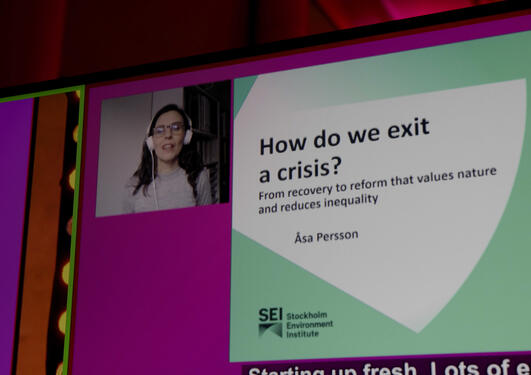Epistemic Inequalities: The Challenge of Decolonizing Knowledge in Gender Studies
This SDG conference panel hosted by Redi Koobak at the Centre for Women's and Gender Research (SKOK) takes up the recent upsurge of interest in and attempts to decolonize knowledge.

Main content
This topic has important repercussions for gender studies and the production of knowledge on gender, race and sexuality on the local, national and transnational level.
While feminists have for long debated whose knowledge counts, feminist knowledge itself is firmly implicated in power relations and legacies of colonialism. In particular, we will contemplate the challenges of living up to this perceived ideal of decolonizing knowledge in various geopolitical contexts, considering how it is taken up differently in the Global North and the Global South. The discussion will revolve around the following questions:
- How does the call to decolonize knowledge circulate across the globe and what kind of new knowledge does it make possible?
- How do we avoid reproducing colonial dynamics in our research dedicated to promoting social justice with reference to e.g. gender-based violence and migration?
- How do we work together across physical and structural borders?
- How do we foster a transnational analytic of care and solidarity to challenge epistemic inequalities?
This event is relevant for SDG 5: Gender Equality
Practical information
The panel was part of the programme of Day Zero of the SDG conference, and was streamed on the conference's own platform from 13.30 to 15.00 on 10 February.
PLEASE NOTE:
A recording of the panel is available here at the conference's site (you may have to log in via a previously registered profile to see the recording).
The event was free.
Panel organizer: Redi Koobak, Centre for Women's and Gender Research (SKOK), University of Bergen
Chair: Kari Jegerstedt, SKOK, University of Bergen
Presentations
Phoebe Kisubi Mbasalaki
I will be engaging with this conversation through the rubric of collaboration as a praxis. I have been grappling a lot with collaboration across borders (structural borders), especially because the current project I am working on is embedded in this. What is at stake when institutions with historically institutionalised power such as elite universities like the university of Cape Town where I am based collaborate in research projects with subaltern communities like sex workers, who really benefits? Starting with the student protests (#RhodesMustFall and #FeesMustFall), I will locate the first cross-border collaboration in this moment and secondly, I will delve into my current research on curatorial praxes as an intervention/interaction/interruption to gender and cultures of inequality with a group of sex workers in Cape Town.
Astri Dankertsen
In this presentation, I will discuss how to make space for Sámi feminist perspectives within both Sámi studies and feminist studies. I argue that there is a need for decolonizing feminist perspectives within both these fields, and how this is linked to knowledge production and power. I argue that while it is a growing awareness of the importance of Sámi and Indigenous feminism, we need to move beyond reproducing often opposing stereotypes about the situation of Sámi women. Sometimes they are presented as essentialized, strong women. Other times they are presented as victims of their own traditional society. Rather than reproducing these stereotypes, we need to include more dynamic and critical perspectives that gives space for feminist voices within Sámi and Indigenous societies.
Redi Koobak
In this paper, I will consider the resonances and dissonances between postcolonial and postsocialist analytics from the point of view of the location of Eastern Europe within transnational feminist theorizing. In particular, I will explore what this particular focus might reveal about the current debates on decolonizing knowlege and how it might shift the established ways of thinking about the intersections of gender, race, sexuality, migration, diasporas, indigeneity and disability.
Ro Averin
In this new age of ‘decolonizing the academy,’ our conversations often begin and end with what decolonization within the academy looks like for academics and their research. But what about the institutions they inhabit and produce from? Can decolonial practices within academic research take firm hold if institutional administrations do not take steps to promote social justice and avoid colonial dynamics throughout the university's structure? This paper will consider these questions, and explore some obstacles to decolonial praxis in the postsecondary institution, especially the replication and/or reinforcement of cisheteropatriarchal, colonial dynamics resultant from superficial engagement with social justice principles.

